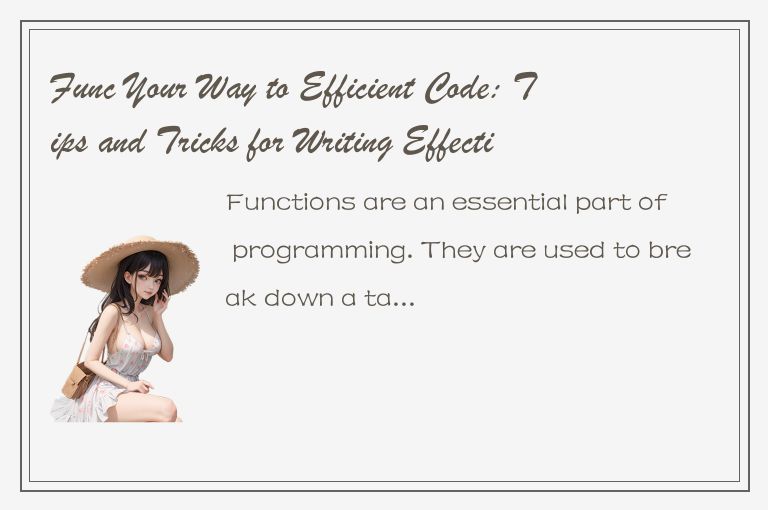Functions are an essential part of programming. They are used to break down a task into smaller pieces and make the code easier to read and maintain. Writing effective functions is crucial to producing efficient and clean code. In this article, we will explore some tips and tricks for writing efficient functions.

1. Use Descriptive Names
The name of the function should describe what it does. This makes it easier for other developers to understand what the function does and how it works. Use descriptive names and avoid using short, meaningless names. For example, instead of using the name "func," use "calculate_total_sales" or "convert_temperature_to_fahrenheit."
2. Keep Functions Small
The shorter the function, the easier it is to understand and maintain. A function should do only one thing and do it well. If your function does more than one thing, break it down into smaller functions. Aim for functions that are no longer than 30 lines of code.
3. Avoid Global Variables
Global variables can cause problems when used in functions. They can make the function harder to test and debug, and they can cause unintended side effects. Instead, pass variables to the function as arguments or use a class to encapsulate them.
4. Use Default Arguments
Default arguments allow you to set a default value for an argument if none is provided. This can make your code more concise and reduce the number of function calls needed. For example, you could define a function with a default value for a parameter like this:
```python
def calculate_discount(price, discount_percent=10):
return price * (1 - (discount_percent / 100))
```
This function can now be called with either one or two arguments.
5. Raise Exceptions Instead of Returning Error Codes
When an error occurs in a function, it is better to raise an exception instead of returning an error code. This makes the code cleaner and easier to understand. Additionally, it makes it easier to handle errors in the calling code. For example:
```python
def divide(dividend, divisor):
if divisor == 0:
raise ValueError("Divisor cannot be zero")
return dividend / divisor
```
6. Keep the Function Pure
A pure function is one that has no side effects and returns a value based solely on its input arguments. Pure functions are easier to test and debug and are less likely to cause problems. When possible, try to write functions that are pure.
7. Avoid Mutating Arguments
When passing arguments to a function, avoid mutating them. This means that you should not modify the value of the argument within the function. Instead, create a copy of the argument and modify the copy. This helps avoid unintended side effects and makes the function easier to reason about.
8. Use Docstrings
Docstrings are used to document functions in Python. They should describe what the function does, what arguments it takes, and what it returns. Docstrings make it easier for other developers to use your functions and can help prevent bugs.
In conclusion, writing efficient functions is essential to writing efficient code. By using descriptive names, keeping functions small, avoiding global variables, using default arguments, raising exceptions instead of returning error codes, keeping functions pure, avoiding mutating arguments and using docstrings, you can produce clean, readable, and maintainable code. Remember to keep these tips in mind when writing your functions and always strive to write code that is efficient and effective.




 QQ客服专员
QQ客服专员 电话客服专员
电话客服专员